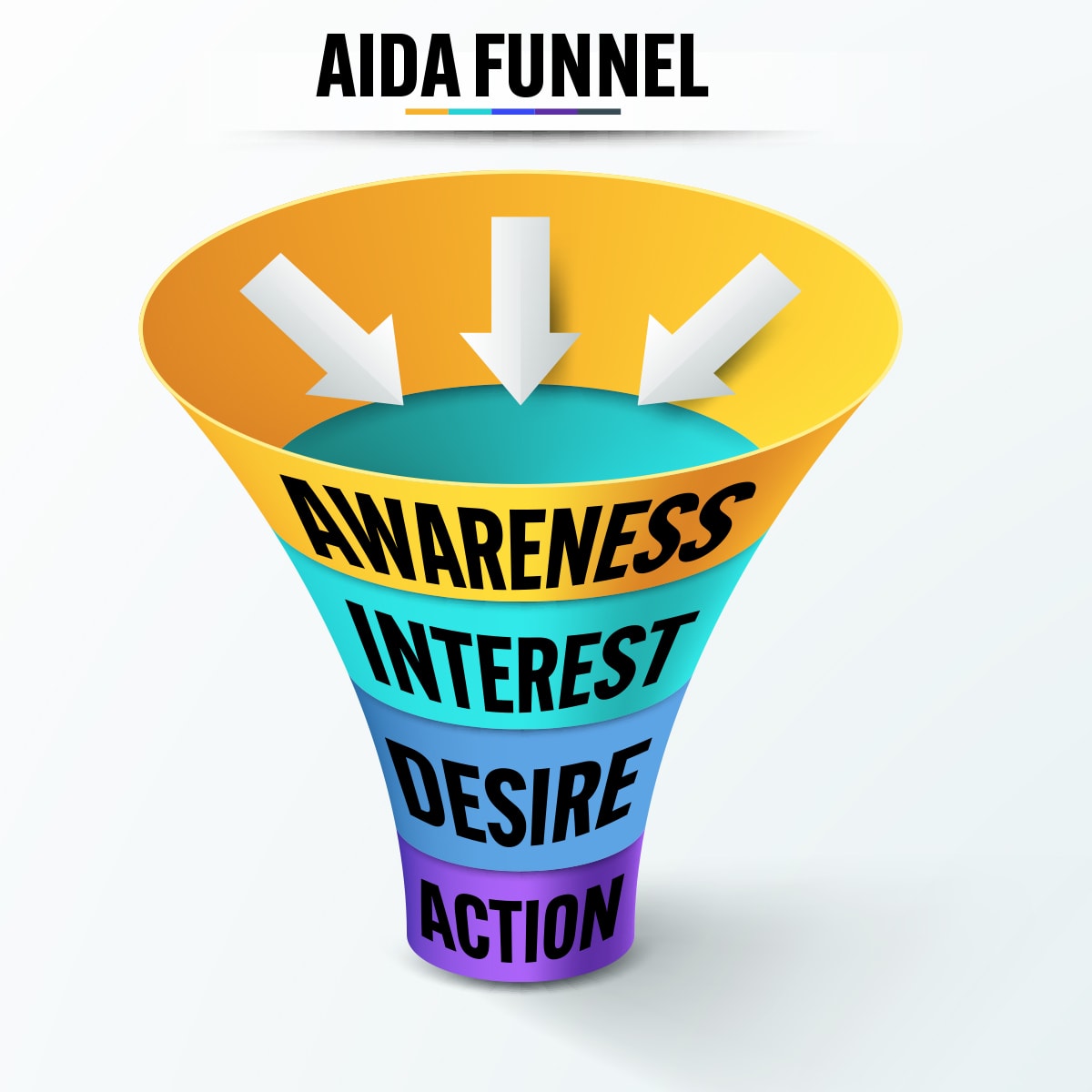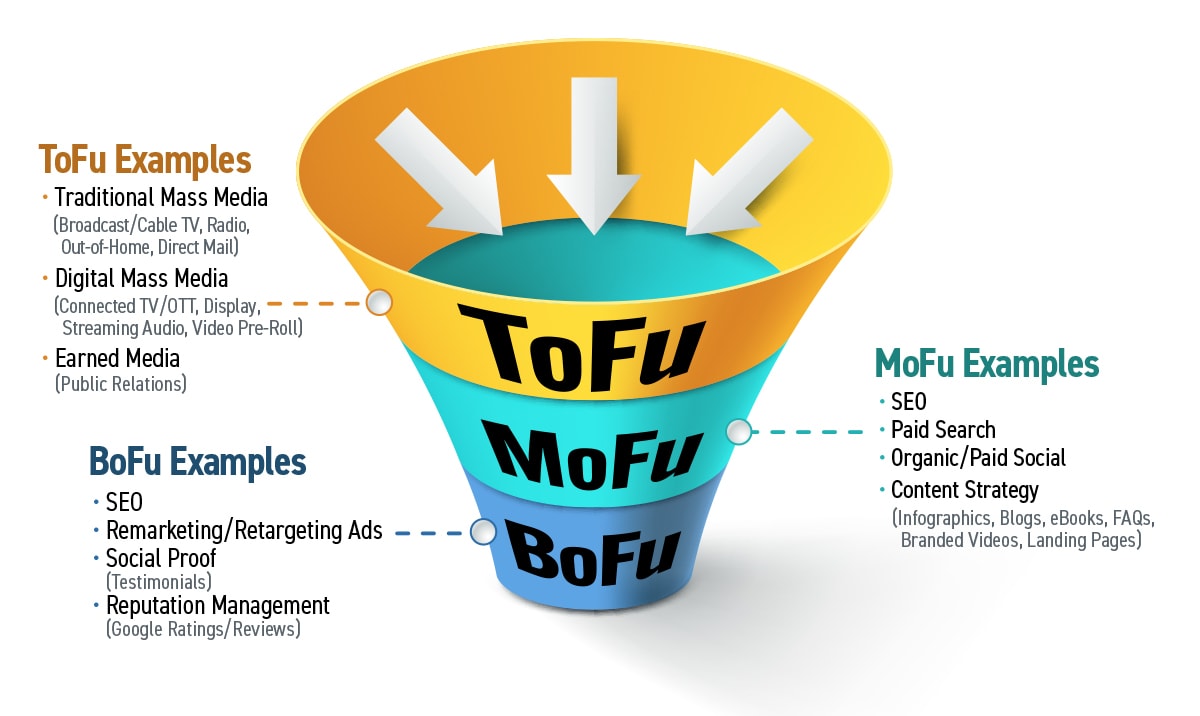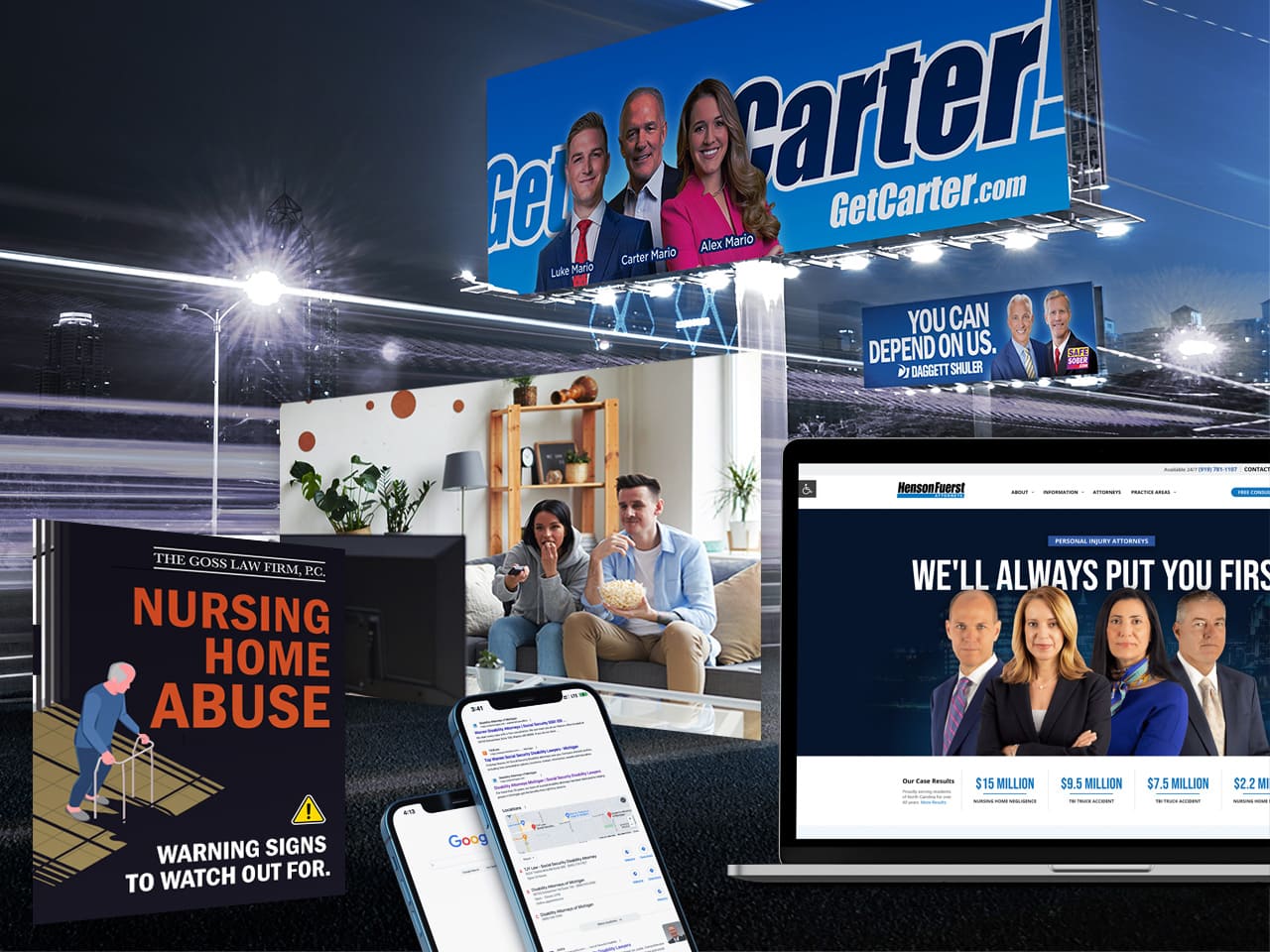Optimizing your Marketing Mix with a Full-Funnel Approach.
You know how much time, effort and money you pour into your marketing initiatives, and subsequently see the leads come in – but what happens in between? When marketing your law firm, understanding a potential client's journey from initial awareness to conversion is essential to marketing success. This journey is often visualized through what's known as the marketing funnel.
Understanding the marketing funnel is the first step toward maximizing your marketing efforts. By implementing a full-funnel approach that spans every phase of the customer journey, you ensure that your marketing reaches your target audience and keeps them informed and engaged up until they are compelled to become a client.

What is the Marketing Funnel?
The marketing funnel is a visual representation that illustrates the customer journey from awareness of a product or service to final purchase decision. While there are various versions of the funnel, at their core, they include the stages most commonly illustrated in the simplified AIDA model, starting at the top with Attention, then descending to Interest, Desire, and Action.
Why is it Important?
Understanding the marketing funnel helps law firms:
- Grasp lead generation. It provides insight into how prospects are attracted at the top of the funnel and eventually converted into clients at the bottom.
- Assess marketing impact. It enables evaluation of the effectiveness of marketing efforts at each stage of the journey.
- Tailor marketing strategies. It guides in determining the most suitable marketing strategies and tactics for each stage of the funnel.
- Identify areas for improvement. It helps pinpoint potential gaps in marketing efforts and areas where conversion efforts may need enhancement.
Breaking Down the Stages of the Marketing Funnel
The marketing funnel can be simplified into three key stages:
- Top of the Funnel (TOFU): Awareness. This stage is all about reach. It focuses on casting a wide net to attract potential clients with little to no knowledge of your firm because they’ve never needed your services before. Your marketing efforts should attract attention, generate interest, and build trust and value at this stage. So, instead of marketing your law firm’s attributes right off the bat, focus on your customers’ needs and speak to their pain points and what they’re going through. Then, introduce your firm and begin to explain how it can help solve their problems.
- Middle of the Funnel (MOFU): Consideration. At this phase, prospects are engaged and actively seeking information to address their problem and determine what is best for them. Create interactions that educate and engage with prospects, provide valuable information, and guide them toward considering your firm as the solution. Answer critical questions such as, “Why do I need an attorney?” Empower them by helping them understand how to solve their problem. Here, you can demonstrate how your firm offers them a solution.
- Bottom of the Funnel (BOFU): Conversion. At this stage, you’ve captured consumers’ attention, educated them about your services, and built trust in the first two stages. They have engaged with your brand and are familiar with your firm. Now, they are ready to make a decision and become clients. At this stage, your goal is to convince them that you are the best choice of firms to work with. Focus on removing barriers to conversion, reinforcing their decision to choose your firm, and provide a seamless conversion experience.

Use the Funnel as a Guide, Not Gospel
Keep in mind that the marketing funnel is a guide rather than a rigid framework. Like purchasing habits, consumer journeys are not always linear; individuals may enter and exit the funnel at different stages. Monitor your efforts constantly and make adjustments as guided by your audiences’ specific journeys.
Optimizing the Marketing Mix at Every Stage
Now that we understand the marketing funnel, let's explore how to utilize marketing tools and develop marketing strategies tailored to each stage of the customer journey.
ToFu Examples
-
Traditional Media (e.g., Broadcast TV, Cable TV, Radio, Out-of-Home, Direct Mail) makes the most significant impact on broad reach and awareness.
-
Digital Media (e.g., Connected TV, OTT, Streaming Audio, Digital Display, Video Pre-Roll) to supplement the broad reach of traditional media using enhanced targeting tools.
-
Earned Media, such as Public Relations, to enhance credibility.
MoFu Examples
-
Paid Digital Media (e.g., Paid Social and Paid Search) to target and engage prospects when they are actively researching solutions.
-
Content Strategy (e.g., Organic Social, Infographics, Blogs, eBooks, FAQs, Brand Videos, Landing Pages) to develop informative content to educate and nurture leads.
BoFu Examples
-
Digital Media (e.g., SEO, Remarketing Ads) to reinforce brand messaging, capitalize on top-of-funnel marketing efforts, and convert.
-
Inbound/Website Marketing (e.g., Attorney/Staff showcase) to highlight expertise.
-
Social Proof (e.g., Testimonials) and Reputation Management (Google Ratings/Reviews) to reinforce trust and validate their decision to work with you.
The Importance of a Full-Funnel Strategy
Modern marketing is often divided into brand building and performance marketing. Brand building focuses on creating and nurturing a strong brand identity, fostering emotional connections with consumers, and establishing long-term loyalty. On the other hand, performance marketing emphasizes measurable outcomes and direct responses, such as lead generation, conversions, and sales.
However, a balanced approach that combines both is crucial for sustained growth. For example, brand building is long-term approach which requires a heavier investment and can be difficult to measure, and performance marketing relies heavily on data and produces short-term solutions, instead of long-term growth. Brand building and performance marketing need one another for a full-funnel strategy and to achieve a comprehensive marketing mix.
With a balanced full-funnel strategy, a strong brand identity enhances the effectiveness of performance marketing efforts by increasing consumer trust, loyalty, and engagement. Conversely, performance marketing provides valuable data insights and feedback that can inform and refine brand building strategies, ensuring they remain relevant and impactful and guiding users down the funnel to conversions.
Why You Need a Full-Funnel Strategy
A balanced approach ensures that efforts are not limited to just one stage of the funnel. Combining brand building with performance marketing maximizes reach and conversion potential throughout the marketing funnel.
A full-funnel marketing strategy that combines brand building and performance marketing is essential for sustained growth in today's competitive landscape. By embracing both approaches and integrating them seamlessly across the customer journey, businesses can maximize their reach, engagement, and conversion potential, ultimately driving long-term success and profitability.
Legal Marketing to Convert Users to Clients
Unlocking success in marketing for law firms relies on understanding the marketing funnel and integrating efforts effectively. Yet, navigating this funnel requires a strategy for each stage of the consumer journey. Working with an agency specializing in full-funnel marketing can help define and execute a strategy that drives results and fosters long-term growth.
At Legal Communications Group, law firm marketing isn't just a part of what we do—it's our sole focus. We stand ready to become your trusted legal marketing partner, dedicated to maximizing your caseload through meticulously crafted full-funnel marketing strategies tailored specifically to your firm's unique needs and objectives. With our proven track record of success and commitment to our clients, we will help your firm emerge as the top choice in the competitive legal landscape.
Contact us today by filling out a form online or giving us a call at 215-364-8828 to get the conversation started.







